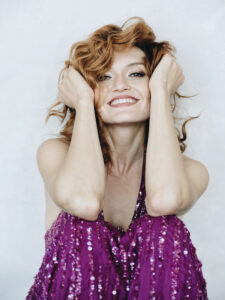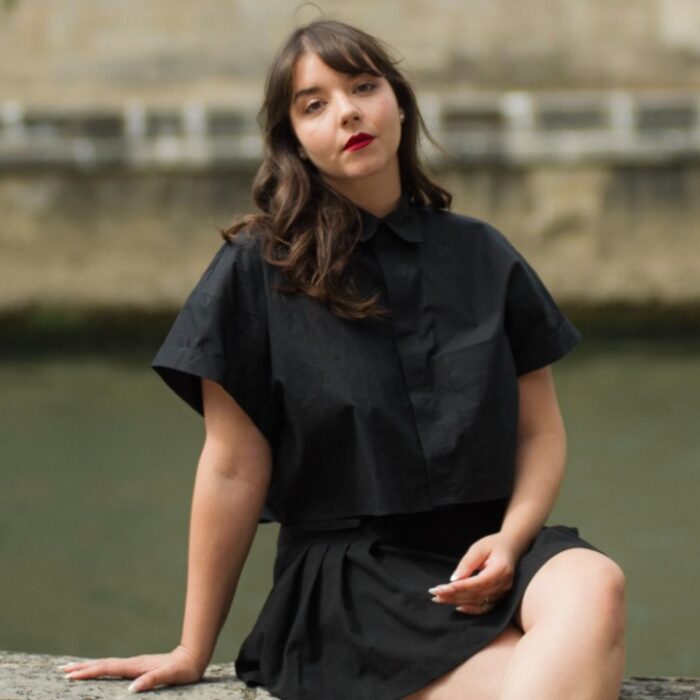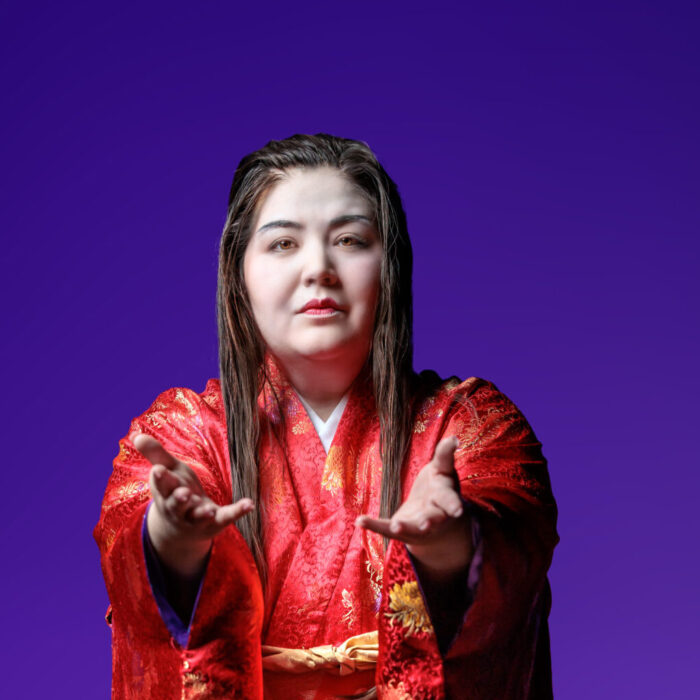
Q & A: Ekaterina Bakanova on ‘Manon’ and Her Favorite Roles to Perform
By Mike Hardy(Photo credit: Enrico De Luigi)
Soprano Ekaterina Bakanova is a Russian born opera and oratorio singer. Italian by adoption, she famously made her Royal Opera House debut in “La Traviata,” with just a few hours notice, after Sonya Yoncheva became ill in 2015. She has since performed in many of the renowned opera houses in the world. She is the winner of numerous important international and national competitions, awards and recognitions.
In this interview, OperaWire takes the opportunity to catch up with Bakanova at her home in Italy’s Venetian region.
OperaWire: I Know you’re currently working hard on preparing for “Manon.” Manon is a complex character, rich in nuances. How did you prepare to delve into her psychology and bring such a controversial and fascinating figure to life?
Ekaterina Bakanova: Since this production is inspired by the character of Brigitte Bardot, I started by watching her films, particularly La Vérité by Henri-Georges Clouzot, which the director Arnault used as a reference for shaping Manon’s personality. He drew inspiration directly from the character portrayed by Bardot. So, I did extensive research on her, and director Bernard Arnault shared many insights about Bardot’s personality. He told me about her strong and rebellious nature, how she is a fighter, which makes her similar to Manon.
OW: What were the vocal challenges you encountered when portraying Manon, and how did you approach them?
EB: First of all, the vocal tessitura. The role of Manon requires different registers within one vocal line. The singer has to manage a long and demanding role, where various vocal nuances are needed. It ranges from a lighter tessitura in the first aria, which is already quite narrative, to the second act, which becomes more lyrical and dramatic, introducing the first dramatic notes. The third act sits more centrally, while the fourth and fifth acts require a lower register. This escalation of tessiture is somewhat similar to what we find in “La Traviata,” but “Manon” has a more challenging writing for a soprano. For example, I am not a light lyric soprano, I am a lyric soprano with agility, and for me, the third act is the most challenging because it requires higher notes. I rely on technique to control my vocal production because it’s not my most comfortable register. To tackle the third act confidently, I need to manage the first and especially the second act well, conserving strength and vocal intensity for the entire performance.
OW: Are there aspects of the character that you feel resonate with your personal experience or sensitivity?
EB: I must say I feel quite close to Brigitte Bardot because she was born under the sign of Libra, and I am also a Libra. Actually, the director Bernard Arnault and the tenor Atalla Ayan are also Libras! So, we can say this production was created under the sign of Libra. I love this sign because it carries a strong sense of femininity and justice, which I also find in my personality. Manon lives on the edge, constantly challenging herself and taking huge risks to give her life meaning. While I don’t share her need for such extremes, I, like her, am a fighter and a rebel in a positive sense—rebel when justice and fairness are at stake, and I’m willing to fight for that, just as Manon does. Manon is also deeply loyal; she loves Des Grieux and only him until the end, and in this, I find a connection with my own nature.
OW: Is there a particular moment in the opera that moves you the most or that you consider the heart of Manon’s drama? How do you prepare for that scene, both emotionally and vocally?
EB: Thank you for asking. Often, conductor Evelino Pidò and director Bernard Arnault and I discuss our favorite moments in this opera. For me, I love the aria in the first act, but perhaps my favorite act is the second, with “Adieu notre petite table.” In this aria, Manon appears timid, introverted, and passionate at the same time. The tessitura requires a lower and more central register, which aligns perfectly with my vocality, allowing me to express and declaim the text more effectively. I worked a lot on pronunciation and phrasing, and I really liked how the director staged this scene. Manon sings this beautiful aria while peeling potatoes because she knows life goes on—she’s preparing dinner, she knows she’s lost the man she loves, but she knows life continues. This reminds us that the choices we make define our path, and she has accepted this, despite her tears. I find this a beautiful reminder to love life and to keep moving forward, even though the music is so tragic and hints at the end of her love and of Manon herself.
OW: Manon is often seen as a female figure challenging the conventions of her time. How do you think modern audiences respond to her, and is there something universal about her journey that still resonates today?
EB: Absolutely, it’s a character and an opera with great modern relevance. There are many young women today who behave like Manon, wanting quick results in life or relationships without the patience to nurture growth. Relationships often end prematurely because of this lack of effort. This makes us reflect on the importance of building self-awareness and a strong sense of self, as the decisions we make shape our lives. Manon tries to resist the societal expectations, the decisions made by men with more power, by Des Grieux’s father, and even by her own family, but she fails because she lacks a solid internal center. She’s carried away by others and by circumstances. The lesson we learn is that while we are all shaped by our parents and family, it’s up to us to build ourselves, and that’s what Manon tries to do, though ultimately she is unsuccessful, making choices that lead to her downfall.
OW: I watched a recent recorded performance of you in Puccini’s “La Rondine.” This is an opera that is seldom performed, I find.
EB: Yes, it’s awesome. I love that role very, very much. Now, I would approach it quite differently. I believe I could do it better today, as I’m more prepared technically, and I would shape the phrasing differently. It’s a gorgeous piece. Recently, it’s been performed a little more often, thanks in part to Puccini’s 100-year anniversary celebrations, which have brought renewed attention to some of his lesser-known works. “La Rondine” is a jewel, and I’m glad to see it finding more space on the stage.
OW: Your approach to “La Rondine” seems reflective of your growth as an artist over time. How do you think your experiences in roles like Manon and Violetta have shaped your artistic journey?
EB: This is very true. Each role leaves an imprint, and you grow with each performance. Manon has helped me refine my technique and deepen my interpretative skills, while Violetta taught me how to handle sudden challenges and push beyond my limits. Speaking of Violetta…
OW: Let’s talk about your 2015 Royal Opera House performance of Violetta in “La Traviata.” You had to perform with only a few hours notice after the soprano fell ill. That must have been daunting?
EB: Oh, that was quite an experience! It was around two o’clock in the afternoon, and we were in rehearsals for “La Bohème,” for which I had an official contract. I actually had a ticket for the evening’s performance of “La Traviata,” which was the last scheduled performance with Sonya Yoncheva. The show was sold out, and I had managed to get a standing ticket, and I was really looking forward to it. I was supposed to sing “Traviata” in 2021, but due to personal reasons—a family tragedy—it impacted many of my decisions and appearances at the time.
So, we were finishing the rehearsal, and someone from the artistic department came in and asked me if it was true that I had a ticket for that evening’s performance. I told them yes, and they responded by asking me to stay and actually sing the role! I was completely shocked, but they needed an answer immediately, so I agreed. I quickly called my agent, and before I knew it, I was back at the theater for a wig fitting, costume alterations, and then just 30 minutes of staging before the performance. The cast wasn’t there, and I had never seen the production, so the hardest part was the first act. The entire cast—Germont, Gastone, Baron, Marchese, Flora—entered the stage talking, and I had no idea who they were or from which direction they were coming! But I have a very good memory for these things, so I managed.
OW: Well, you received fantastic reviews for a role that is known to be tough.
EB: Yes, I love the role of Violetta. It’s difficult both to sing and to act. I think every artist brings something personal to it because we are all shaped by our experiences, memories, and feelings. You need to be generous and courageous to open yourself up to that level of vulnerability and share it with the audience.
OW: What is your favorite repertoire to sing, and what roles would you like to perform in the future?
EB: I have a deep love for the French repertoire. I really want to master the language one day, so I work a lot on it when preparing for French roles. I’d love to perform “Thaïs” and Massenet’s works. “Pelléas et Mélisande” is another one I’d love to tackle. I like roles that allow me to dive deep into the drama and give me a lot to work with during the preparation. Mozart is also a favorite, though very challenging. His music doesn’t allow for the same freedom as Massenet or Puccini, but there’s no denying he’s a genius!
OW: What are your upcoming engagements and what should we look forward to from you in the near future?
EB: After “Manon,” I will be performing in “Edgar” at the Opéra de Nice, as Fiordiligi in “Così fan tutte” at the Opéra Théâtre de Metz, and as the protagonist in “La voix humaine” at the Teatro Sociale di Rovigo, a monologue opera that will test my dramatic intensity. Additionally, my schedule includes major international engagements such as “Khovantchina” at the Grand Théâtre de Genève, “Carmen” at the Teatro dell’Opera di Roma, and a very important Christmas concert from the Duomo di Assisi, dedicated to peace.



